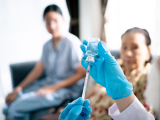Aug 6, 2009 (CIDRAP News) – The World Health Organization (WHO) said today that the fast-tracking of vaccines for pandemic H1N1 influenza won't compromise safety, while acknowledging that clinical data will be limited when the first doses are administered.
"The public needs to be reassured that regulatory procedures in place for the licensing of pandemic vaccines, including procedures for expediting regulatory approval, are rigorous and do not compromise safety or quality controls," the agency said in a statement.
In a news teleconference, the WHO's Dr. Marie-Paule Kieny said the first results of H1N1 vaccine clinical trials are expected in the first half of September, and some countries may start using the vaccines the same month, if their regulatory agencies approve. Trials are under way in China, Australia, the United Kingdom, Germany, and the United States, she said.
The trials are mainly designed to determine whether one or two doses of vaccine will be needed to induce an immune response, while providing some safety data.
Kieny, director of the WHO Initiative for Vaccine Research, noted that the United States may treat H1N1 vaccines the same way it handles the switching of viral strains in seasonal flu vaccines, which does not require clinical trial data for licensing. European regulators do require a clinical trial for a strain change in a seasonal vaccine, she said, but manufacturers that have previously filed data for a "mock-up" pandemic vaccine may get approval for an H1N1 vaccine before submitting clinical trial data.
The WHO statement said some media reports have voiced concern about the safety of H1N1 vaccines. The agency said vaccines need to be made available quickly and in large quantities to fight the pandemic. That didn't happen in the 1957 and 1968 pandemics, when vaccines arrived too late to be of much help during the height of the outbreaks.
Better yields expected
Kieny said a better-yielding vaccine seed strain may be on the way to replace the strains now in use, which have yielded disappointingly small amounts for inactivated vaccines. The WHO's collaborating centers have been working to develop strains that grow better in eggs, "and the latest result we've heard as of this week is that at least one of the strains seems to be promising and seems to get equivalent yields to the ones the manufacturers have for seasonal vaccines," she said. "It seems we've found a way to get around this problem."
She gave no details on where the improved strain was developed, but a Canadian Press report published yesterday said it was produced by Britain's National Institute for Biological Standards and Controls.
Kieny declined to make any predictions about global H1N1 vaccine production capacity. She said an earlier projection of up to 94 million doses per week was a best-case scenario, and the WHO needs more data before making any new predictions. "I prefer to give a response when the yields are known and the immunogenicity is known," she said.
Regulatory pathways
Concerning regulatory issues, the WHO statement said that some pandemic vaccines are not regarded as entirely new, because they build on seasonal vaccine technology, established testing procedures, and a large body of safety data. "In such cases, approval procedures are similar to those applied to 'strain changes' made each year when seasonal vaccines are modified to match circulating viruses in the northern and southern hemispheres."
Kieny noted that the US Food and Drug Administration expects to use this approach with H1N1 vaccines based on the same technology and processes as seasonal vaccines. "For those pandemic vaccines that will be like a strain change, with H1N1 instead of another strain, FDA has decided they'll treat this as a normal strain change, and therefore vaccine will be registered without clinical trials," she said.
However, that won't be the case with vaccines containing dose-sparing adjuvants, she noted. Because the United States, unlike Europe, has never licensed an adjuvanted flu vaccine, US regulators "will request to review full clinical development," she said.
The US government has ordered millions of doses of two different adjuvants, and officials have said that adjuvanted vaccines could be used under a special emergency authorization.
The European Union requires small clinical trials for strain changes in seasonal flu vaccines, Kieny said. But she noted that in view of the threat of H5N1 avian flu, the EU set up a process allowing manufacturers to develop prototype, or mockup, H5N1 vaccines and submit data, with the understanding that when a pandemic emerged, the pandemic strain could be substituted for the prototype strain.
Manufacturers that filed mockup vaccine data "can present to the regulatory agency all the documentation for the H1N1 vaccine, and as previously agreed already in 2007, obtain a registration without clinical trials," she said.
However, she added that all manufacturers will conduct clinical trials and submit the data as soon as possible, with the earliest expected in September.
"Time constraints mean that clinical data at the time when pandemic vaccines are first administered will inevitably be limited," the WHO statement said. "Further testing of safety and effectiveness will need to take place after administration of the vaccine has begun."
Safety issues inevitable
The agency said safety issues will inevitably arise during mass vaccination efforts. "For example, adverse events too rare to show up even in a large clinical trial may become apparent when very large numbers of people receive a pandemic vaccine."
Such was the case in the swine flu vaccination campaign in 1976, when several hundred people, out of more than 40 million vaccinated, suffered Guillain-Barre syndrome, a paralytic condition. But Kieny said such events are less likely today: "The vaccines we have now are much purer and the quality control and lab testing on today's vaccines is much better than it was 30 years ago."
Kieny said the WHO has no special concerns about the safety of adjuvanted H1N1 vaccines. "We've reviewed the safety of adjuvanted vaccines as they've been tested for H5N1, and more than 40 million doses of adjuvanted vaccine have been used in Europe already," she said.
But in response to a question, she said there has been no experience in the use of adjuvanted flu vaccines in pregnant women, who are a priority group for H1N1 vaccination. The WHO's Strategic Advisory Group of Experts (SAGE), she said, recommended in July that pregnant women should receive unadjuvanted vaccine where possible, but that an adjuvanted vaccine could be used if necessary.
In other comments, Kieny said the WHO is discussing with manufacturers how to provide enough free or reduced-price vaccine to cover healthcare workers in all developing countries. She noted that donations of 100 million and 50 million doses have been pledged so far.
See also:
WHO page with access to press briefing audio files and transcript
http://www.who.int/mediacentre/multimedia/swineflupressbriefings/en/index.html
Aug 6 WHO statement on safety of pandemic vaccines
http://www.who.int/csr/disease/swineflu/notes/h1n1_safety_vaccines_20090805/en/index.html
Aug 6 WHO statement on pandemic vaccine manufacturing process and timeline
http://www.who.int/csr/disease/swineflu/notes/h1n1_vaccine_20090806/en/index.html


















